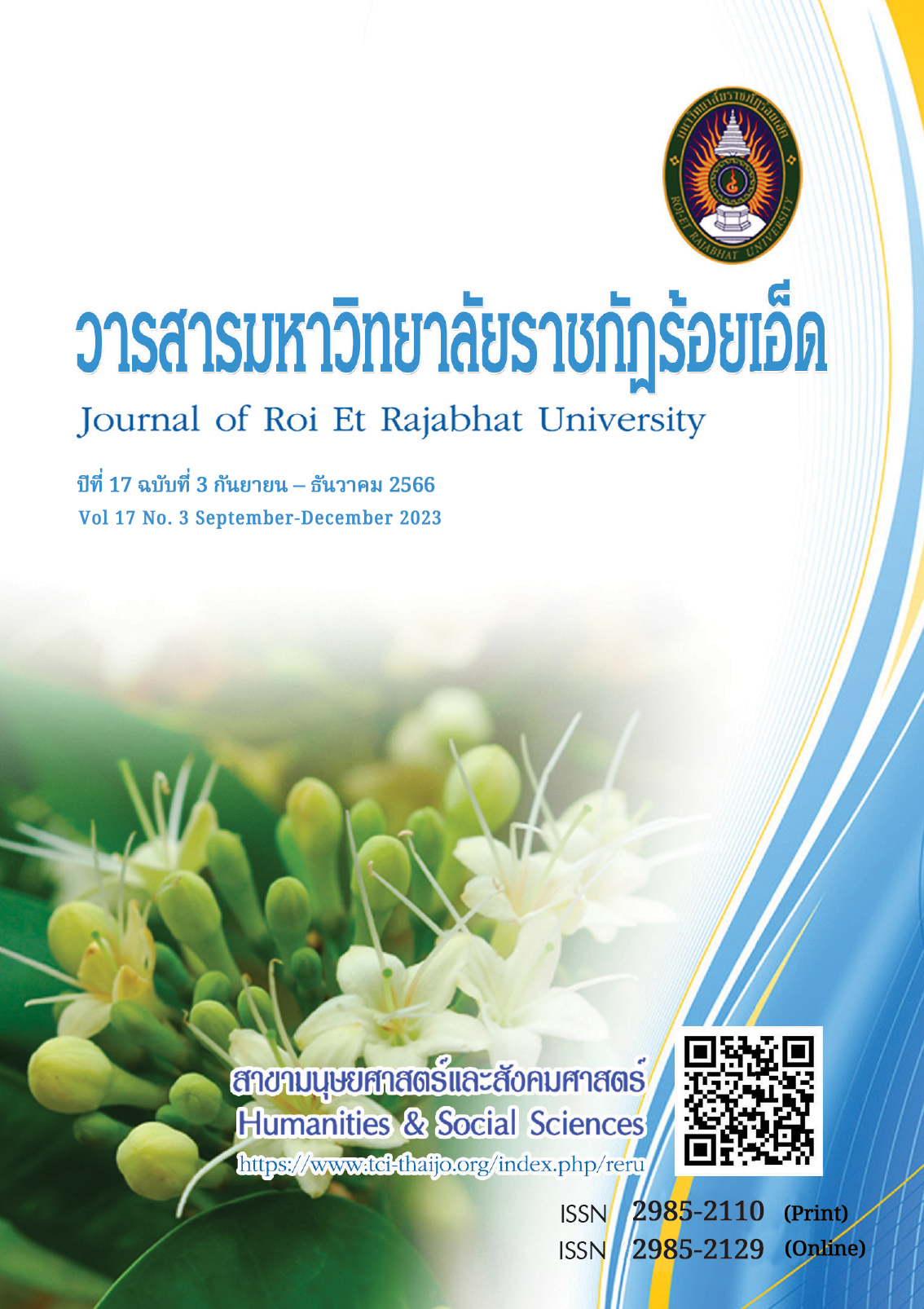The Development of English Listening Skill of Grade 4 Students by the Theory of Communicative Language Teaching Approach
Keywords:
Communicative language teaching, English language listening skill, Growth scoreAbstract
The purposes of this research were 1) to develop English language listening skill of grade 4 students according to the theory of communication language teaching approach with a passing score of 70 percent
or more and 2) to study the Gain Score of English listening skills of grade 4 students. Data were research design by using the Action Research Procedure comprising 3 spirals of action. The target groups used in
this research were 18 grade 4 students of Duangluthai Thaikamonwichalai school, Nong Phok district, Roi Et province, the first semester of the 2020 academic year, selected by purposive sampling. There were 2 kinds of research instrument including: 1) reflection tool which consisted of 10 lesson plans by the theory of communication language teaching approach and 30 item of English listening skills test and 2) reflection tool which consisted of a student studying behavior observation form and a student interview form. The statistics used for data analysis consisted of percentage, mean, and standard deviation. The research findings found that.
1) Testing English listening skills of grade 4 students by organizing learning activities according to the theory of communicative language teaching approach of in the first operating cycle found that the students made a mean score on English language listening skill of 64.44% and 7 of them, or 38.89% of the group, passed the passing criterion. In the second operating cycle, the students made a mean score on English language listening skill of 69.63 % and 10 of them, or 55.56% of the group, passed the passing criterion.
In the third operating cycle, the students made a mean score on English language listening skill of 82.59% and 18 of them, or 100% of the group, passed the passing criterion in the third operating cycle. Therefore,
the English listening skills test of students in round 3 passed the specified criteria which met the prescribed.
2) Students who received learning management according to the development scores in English listening skills for the first operating cycle and the second operating cycle had growth score among the students shown that 34.63% of them were at medium level. While the second operating cycle and the third operating cycle had growth score among the students 67.26% which was at a high level.
References
กรมวิชาการ. (2561). นโยบายและจุดเน้น ศธ.ระดับประถมศึกษา. สืบค้นเมื่อ 18 กันยายน 2565, จาก https://www.moe.go.th/moe/th/news/detail.
กระทรวงศึกษาธิการ. (2554). การประกันคุณภาพของสถานศึกษา. กรุงเทพฯ: โรงพิมพ์คุรุสภาลาดพร้าว.
กระทรวงศึกษาธิการ. (2551). หลักสูตรแกนกลางการศึกษาขั้นพื้นฐาน พุทธศักราช 2551. กรุงเทพฯ: โรงพิมพ์ชุมนุมสหกรณ์การเกษตรแห่งประเทศไทย จำกัด.
เกรียงศักดิ์ ฐานะกอง. (2559). การใช้กิจกรรมการสอนภาษาเพื่อการสื่อสารเพื่อเพิ่มพูนความสามารถในการฟัง พูดภาษาอังกฤษและความรู้ด้านไวยากรณ์ของนักศึกษาระดับปริญญาตรี. วิทยานิพนธ์ ศึกษาศาสตรมหาบัณฑิต สาขาวิชาหลักสูตรการสอนและเทคโนโลยีการเรียนรู้. เชียงใหม่: มหาวิทยาลัยเชียงใหม่.
จุฑามาศ ชนะภัย. (2561). การพัฒนาความสามารถด้านการฟังและการพูดภาษาอังกฤษของนักเรียนชั้นมัธยมศึกษาปีที่ 3 ตามแนวการสอนภาษาเพื่อการสื่อสาร. วิทยานิพนธ์ ครุศาสตรมหาบัณฑิต สาขาวิชาหลักสูตรและการเรียนการสอน.
มหาสารคาม: มหาวิทยาลัยราชภัฏมหาสารคาม.
ธูปทอง กว้างสวาสดิ์. (2549). คู่มือการสอนภาษาอังกฤษ. มหาสารคาม: มหาวิทยาลัยมหาสารคาม.
มณีรัตน์ กรรณิกา. (2561). การพัฒนาทักษะการฟังภาษาอังกฤษโดยใช้รายการโทรทัศน์ของนักเรียนชั้นมัธยมศึกษาปีที่ 3. วิทยานิพนธ์ การศึกษามหาบัณฑิต สาขาวิชาหลักสูตรและการสอน. มหาสารคาม: มหาวิทยาลัยมหาสารคาม.
รมัยาภรณ์ สุขเกษม. (2554). ผลการจัดการเรียนรู้ภาษาอังกฤษตามแนวการสอนภาษาเพื่อการสื่อสารที่เน้นการฟัง-พูด
และการเสริมแรงบวกของนักเรียนชั้นมัธยมศึกษาปีที่ 1. วิทยานิพนธ์ ครุศาสตรมหาบัณฑิต สาขาวิชาหลักสูตร
และการสอน. กรุงเทพฯ: มหาวิทยาลัยราชภัฏพระนคร.
โรงเรียนสาธิตดวงฤทัย ทัยกมลวิชชาลัย. (2562). รายงานผลสัมฤทธิ์ทางการเรียน ปีการศึกษา 2562. ร้อยเอ็ด: โรงเรียนสาธิตดวงฤทัย ทัยกมลวิชชาลัย.
วราพรรณ จิตรัมย์. (2559). ผลการใช้ชุดกิจกรรมฝึกทักษะการฟังและการพูดภาษาอังกฤษสำหรับนักเรียนชั้นประถมศึกษาปีที่ 3 โดยการเรียนรู้เทคนิค CLT. วิทยานิพนธ์ ครุศาสตรมหาบัณฑิต สาขาวิชาหลักสูตรและการจัดการเรียนรู้.
บุรีรัมย์: มหาวิทยาลัยราชภัฏบุรีรัมย์.
วาสนา สิงห์ทองลา. (2555). การพัฒนาทักษะการฟังภาษาอังกฤษของนักเรียนชั้นประถมศึกษาปีที่ 5 โดยใช้รูปแบบ
การจัดการเรียนรู้ภาษาเพื่อการสื่อสาร. วิทยานิพนธ์ ศึกษาศาสตรมหาบัณฑิต สาขาวิชาหลักสูตรและการสอน.
ขอนแก่น: มหาวิทยาลัยขอนแก่น.
ศิริชัย กาญจนวาสี. (2552). ทฤษฎีการทดสอบแบบดั้งเดิม (พิมพ์ครั้งที่ 6). กรุงเทพฯ: จุฬาลงกรณ์มหาวิทยาลัย.
สุมิตรา อังวัฒนกุล. (2540). วิธีสอนภาษาอังกฤษ (พิมพ์ครั้งที่ 4). กรุงเทพฯ: จุฬาลงกรณ์มหาวิทยาลัย.
Escola, Y. H. (1980). Certain Effects of Selected Activities of Communicative Competence Training on
the Development of German: A Case Study. Dissertation Abstracts International, 41: 1985-A.
Kemmis, S. and McTaggart, R. (1988). The Action Research Planer (3rd ed.). Victoria: Deakin University.
Larsen-Freeman, D. (2000). Techniques and Principles in Language Teaching (2nd ed.). Oxford: OUP.
Littlewood, W. (1990). Communicative Language Teaching: An Introduction. Cambridge: Cambridge
University Press.
Ma, T. (2009). An empirical study on teaching listening in CLT. Retrieved June 25, 2015,
from http://files.eric.ed.gov/fulltext/EJ1065671.pdf
Richards, J. C. and Rodgers, T. S. (2003). Approaches and methods in language teaching. New York:
Cambridge University Press.
Richards, J. C. and Rodgers, S. T. (1999). Approaches and Methods in Language Teaching (5th ed.).
Cambridge: Cambridge University Press.
Downloads
Published
How to Cite
Issue
Section
License
Copyright (c) 2023 Roi Et Rajabhat University

This work is licensed under a Creative Commons Attribution-NonCommercial-NoDerivatives 4.0 International License.
บทความที่ได้รับการตีพิมพ์เป็นลิขสิทธิ์ของวารสารมหาวิทยาลัยราชภัฎร้อยเอ็ด
ข้อความที่ปรากฏในบทความแต่ละเรื่องในวารสารวิชาการเล่มนี้เป็นความคิดเห็นส่วนตัวของผู้เขียนแต่ละท่านไม่เกี่ยวข้องกับมหาวิทยาลัยราชภัฎร้อยเอ็ด และคณาจารย์ท่านอื่นๆในมหาวิทยาลัยฯ แต่อย่างใด ความรับผิดชอบองค์ประกอบทั้งหมดของบทความแต่ละเรื่องเป็นของผู้เขียนแต่ละท่าน หากมีความผิดพลาดใดๆ ผู้เขียนแต่ละท่านจะรับผิดชอบบทความของตนเองแต่ผู้เดียว





